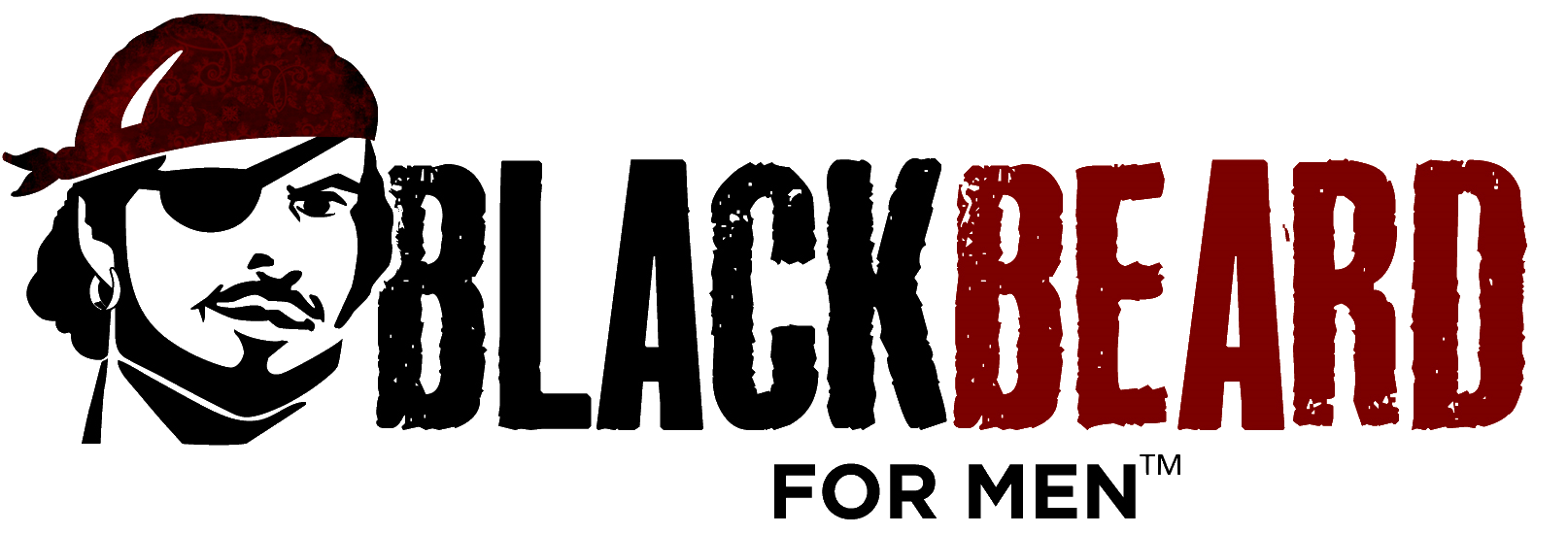Beard Dye Comparison
Beards are in style like never before, and because of this phenomenon, the beard products market has exploded. We’re going to take a look at some of the best beard dye and beard color products on the market today to help you find the right one for you and your beard.
By CAP'N JIM
Everyone with a beard seems to be producing their own overpriced beard oil concocted at their kitchen table by dumping olive oil, berries, and some fragrance in a blender. (Try each and every one of them if it makes you happy. All you’ll lose is money.)
However, when it comes to beard dye or beard color, one should be more judicious. Why? Because the worst things that can happen by choosing the wrong beard oil are a couple of pimples and an empty wallet. Choosing the wrong beard dye or color, however, can have dire consequences – ranging from chemical burns to patchy or orange beards. And no one wants to have to shave the manliness right off their face because they’ve used the wrong beard color or a bad chemical reaction.
“And no one wants to have to shave the manliness right off their face because they’ve used the wrong beard color or a bad chemical reaction.”
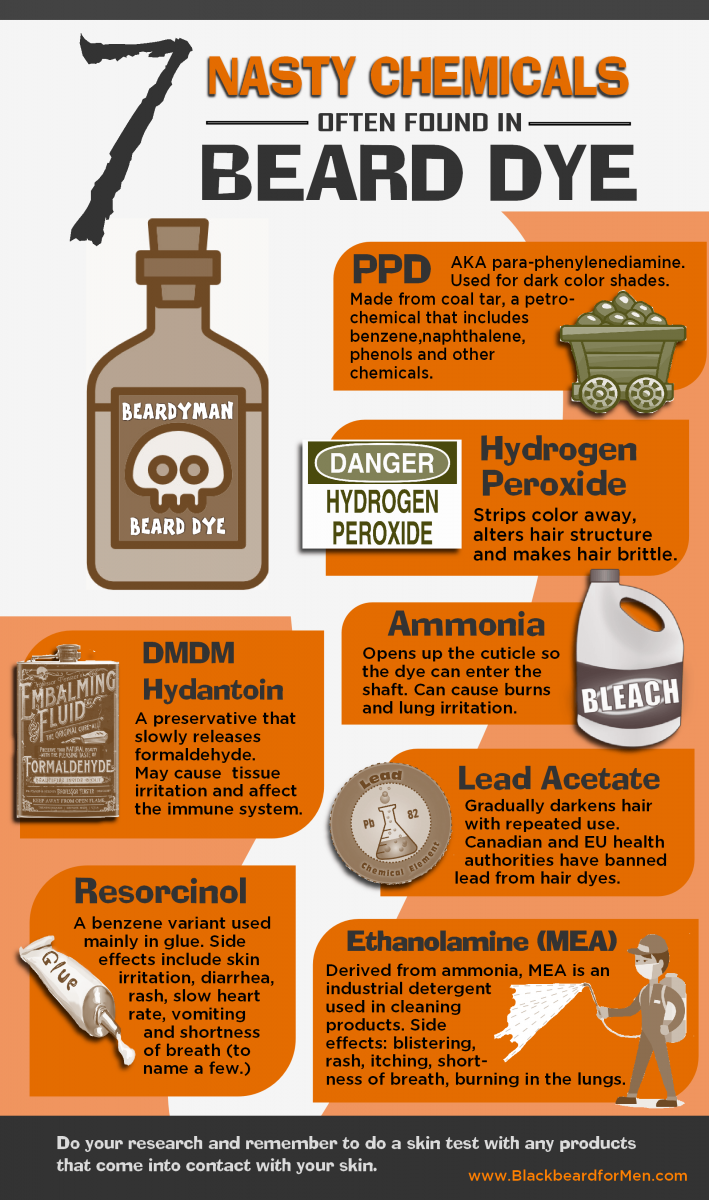
Ingredients
You should carefully read the label to determine what the ingredients are. Ammonia is an ingredient often used in beard dyes to open the hair cuticle, which allows the dye’s color to penetrate the hair follicle. You know, that noxious stuff used in floor cleaner that smells like a hospital. Inhalation can cause coughing as well as nose and throat irritation. Over time, it also causes olfactory fatigue – essentially, if you keep using products with ammonia in them, your early warning system gets turned off and you may not be able to properly detect the dangerous chemical anymore (which, needless to say, can lead to dangers all of its own). Skin or eye contact with even low doses of ammonia can also cause skin or eye irritation in many.
Fortunately, many manufacturers have stopped using ammonia in their products because of the side effects. The bad news is that they’ve mostly substituted the ammonia with ethanolamine. It serves the same purpose as ammonia — it opens the hair follicle. Ethanolamine started out as a solvent in oven cleaners before its other uses were discovered. It works as an alkalizer, boosting the hair’s pH levels, swelling the outer layer so the color can penetrate more fully.
 The upside is that fewer people suffer allergic reactions from ethanolamine than ammonia. The downside is that you’re essentially putting oven cleaner on your face.
The upside is that fewer people suffer allergic reactions from ethanolamine than ammonia. The downside is that you’re essentially putting oven cleaner on your face.
The US Committee on Toxicology in a 1967 report stated that “that skin and eye irritation and immediate signs of irritability and restlessness followed by central nervous system depression are the major adverse effects.“ Prolonged exposure to ethanolamine has also been linked to cancer. FDA animal studies found that it encourages the formation of tumors, and that prolonged exposure can result in liver, kidney or nervous system injury.
Resorcinol is the compound that actually dyes the beard. Primarily, resorcinol is used by the rubber industry in the production of tires. It’s also used in wood glues and chemical fertilizers. The EU Commission has done a report on common dye ingredients and found that resorcinol disrupts thyroid function and that can manifest in hyperthyroidism and an enlargement of the thyroid gland also known as a goiter. Resorcinol is also acutely toxic if it’s consumed orally or used in high doses.
The next ingredient to watch out for is para-phenylenediamine (PPD). PPD is used as a dye for dark color shades and is made from coal tar, benzene, naphthalene, phenols, aniline, and other chemicals. It is also used as a wood preservative. According to a study done in Germany, PPD is the 5th most common skin allergen. It’s also linked to an increased risk of bladder cancer. When used together with hydrogen peroxide it can form a DNA-altering substance called Bandrowski’s Base. When ingested, it can cause respiratory distress and renal failure.
There are also some “gradual change” or “progressive” hair and beard dyes on the market. These brands will have you believe that they’re less damaging because any change happens gradually over a period of time. Many of these products use lead acetate, used as a color additive for the dark shade hair dyes. Lead is a heavy metal known to cause anemia and produce neurological problems. It can also lead to serious health issues including cancer. Lead acetate hair dyes actually can cause elevated lead levels throughout the homes of people who use them, potentially triggering health issues for other family members, too.
In general, a good rule of thumb before purchasing anything you put on your skin is to make sure that it’s hypoallergenic. And when in doubt, ask your doctor.
Ease of Use and Time of Application
Purchasing a box of drugstore beard dye might make you feel like you need to apply to chemistry grad school. You’ve got gloves, tubes, mixing bowls as well as several applicators and not to mention the dense instruction booklet. Then you have to inhale the toxic fumes while mixing everything together while hoping that you’re getting it right; otherwise, you may end up with burns or a bright orange beard.
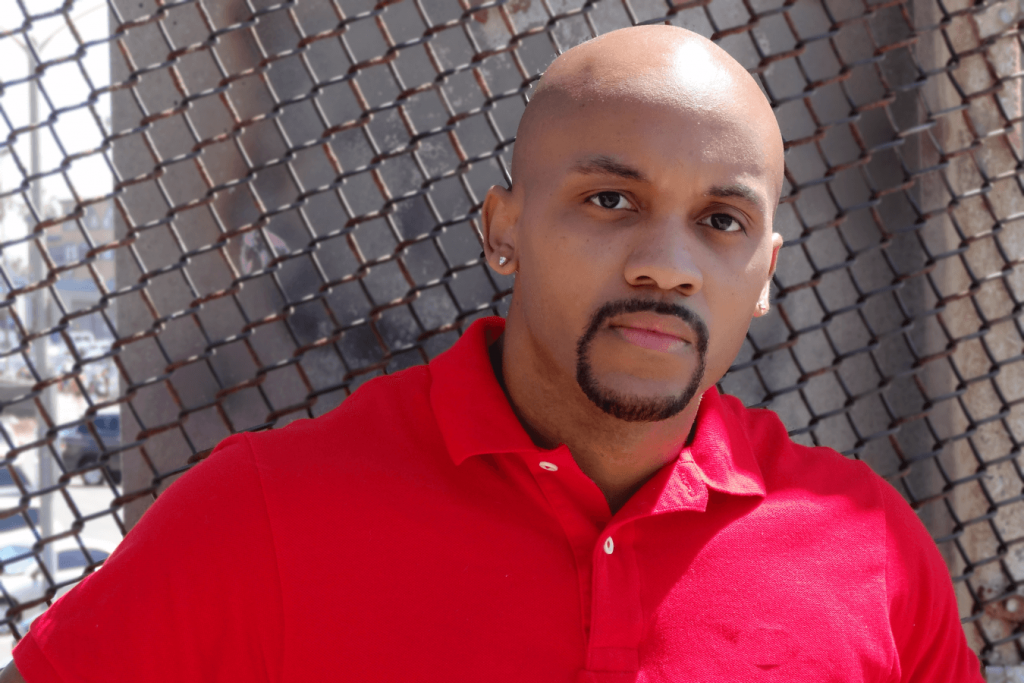 Another option are pre-mixed beard dyes. These combine the chemicals for you into a single bottle with brush applicator attached. So application is much faster and simpler. However, it’s still the same chemicals, so skin and olfactory irritation is still a possibility, and you still have to breathe the acrid chemical odor for five minutes and then take a shower afterwards.
Another option are pre-mixed beard dyes. These combine the chemicals for you into a single bottle with brush applicator attached. So application is much faster and simpler. However, it’s still the same chemicals, so skin and olfactory irritation is still a possibility, and you still have to breathe the acrid chemical odor for five minutes and then take a shower afterwards.
If you’re dealing with henna-based dye, you won’t inhale toxic chemicals, but you’ll have to repeat the arduous process numerous times for the dye to have any effect whatsoever. Users report that it takes several time-consuming applications over a period of days or even weeks (!) to build up the proper color intensity. The good news is that the products are much gentler on the skin.
The gradual color products are sometimes shampoo-in and are much less hassle. However, like henna dyes, they often take many applications to build up the right color intensity, and often they can never quite get you back to your natural hair color.
In short, when it comes to beard dye, you will get a permanent or semi-permanent color that lasts weeks; but regardless of whether it’s chemical or henna-based, application likely won’t be easy and instant.
Blackbeard for Men instant, brush-on beard color, however, applies quickly and instantly. Because it is not a dye, there are no gloves, no messy clean-up, and no harsh chemical odors. Application time is in seconds, not minutes or multiple days.
The Right Color for a Natural Look
Needless to say, if your hair and beard are naturally blonde, you don’t want to dye your graying beard black. Picking the right shade is important if you want to achieve a natural look. After all, you don’t want to leave the house with your newly dyed beard just to hear a passerby say: ‘ha, nice dye job.’
 Your natural beard is composed of different colors. The color variations are, in most cases, subtle, but the different shades work in concert to create an overall “color.” That makes it tricky to choose the right beard dye color, because you can easily pick one that makes your beard look too dark. Often men overreact — especially after spotting the creeping gray in their beards for the first time — and buy beard color that’s way too dark for them. Yes, it will knock out the gray; but it will also make it very obvious that there is a dye job at work. When in doubt, go a shade lighter to be on the safe side.
Your natural beard is composed of different colors. The color variations are, in most cases, subtle, but the different shades work in concert to create an overall “color.” That makes it tricky to choose the right beard dye color, because you can easily pick one that makes your beard look too dark. Often men overreact — especially after spotting the creeping gray in their beards for the first time — and buy beard color that’s way too dark for them. Yes, it will knock out the gray; but it will also make it very obvious that there is a dye job at work. When in doubt, go a shade lighter to be on the safe side.
Most beard dyes will result in a very uniform look. But if you look at a man’s natural beard, you’ll notice that beard color is never uniform. Hence, the dying process, even if you’ve picked the right shade and followed all of the instructions to the letter, can often lead to fake-looking results. If a natural look is a big concern for you, then we suggest sticking to non-permanent dyes since they usually give you more control over the entire process as well as the final result. Blackbeard for Men instant, brush-on beard color allows one to vary the tonality from heavy to dark simply by how much product one puts on (or wipes away,) allowing for a far more natural look than beard dyes can achieve.
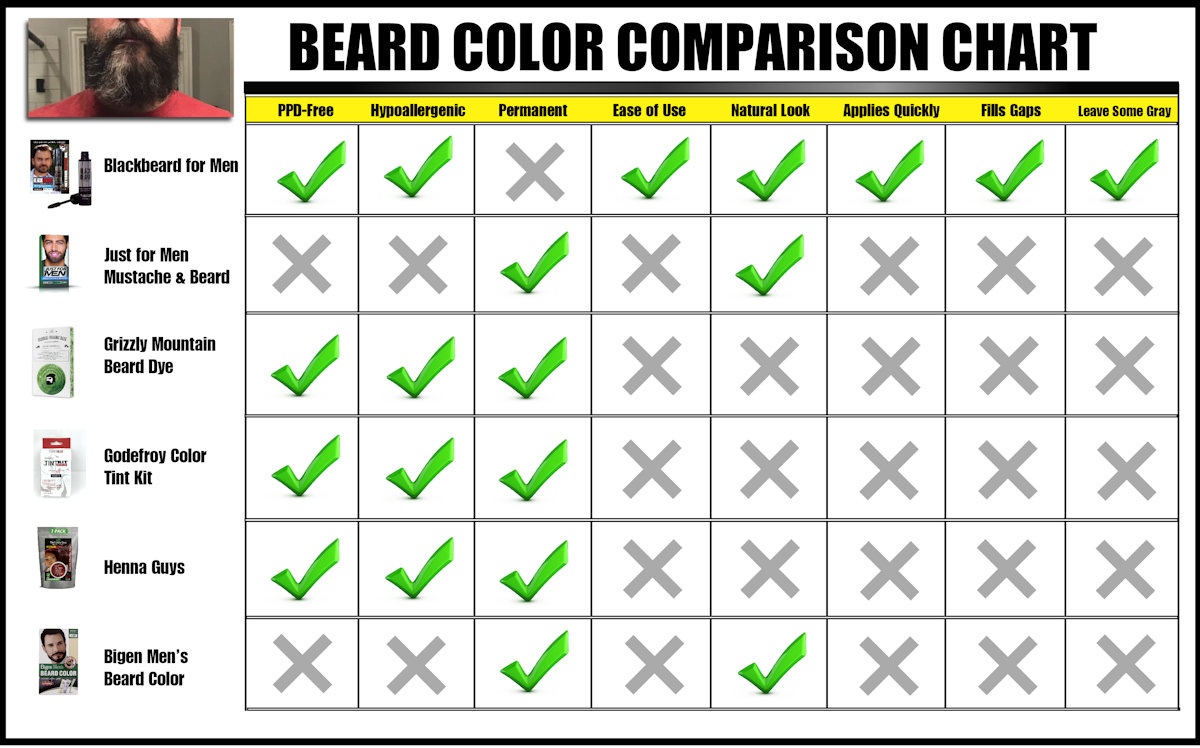
Why these products?
We included the most widely used beard color products on the market. We left out some well-known names (like Clairol and RefectoCil) because they are mainly hair dyes, even though some people use them to dye their beards. If you’re wondering why that’s a bad idea, please go ahead and touch the hair on your head and then touch your beard. You may notice the very different texture of the hair on your head versus your beard. Facial hair is often more coarse than the hair on your head. Different textures and consistencies require different treatments, which is why it’s never a good idea to use a product formulated for one type of hair on another type of hair.
How did you rate them?
We figured the most accurate and fair way to do that was via customer reviews. And what website has more customer reviews than Amazon? So we dove deep into customer feedback in order to bring you what we hope is a fair and accurate assessment of different beard dyes.
How did you pick the categories?
We selected the categories based on aspects of products that kept popping up in many reviews. In other words, based on what was important to the customer. You may notice that we didn’t distinguish between permanent, semi-permanent, and temporary beard dyes. That is because the customers didn’t. In fact, many men seem to use all of the above interchangeably.
 Before we go through the reasons for our ratings, let’s quickly explain the difference between the different types of beard dye and beard color.
Before we go through the reasons for our ratings, let’s quickly explain the difference between the different types of beard dye and beard color.
Permanent dyes: as the name implies, you put them on and they stay… at least until the new beard growth appears (AKA your roots.) The upside of this approach is easy to spot: you put it on once and you’re done (at least for a couple of weeks). The downside: once you’ve put it on, you’re stuck with it. If you don’t like the look, your only option is to shave… or try dyeing again. You will also run the risk of allergic reactions and you have minimal control over creating a natural look.
Semi-permanent dyes: they are often henna-based. Henna is a traditional Indian herb and is mixed with other natural ingredients to form a hypoallergenic beard color agent. The upside here is the fact that you’ll rarely be in danger of an allergic reaction. The downside consists of the cumbersome application process – it needs several applications to show any results at all. And it does some colors better than others. Let’s just say if your name is Carrot-Top, then henna is for you. Black, not so much.
Temporary dyes: the name says it all: they don’t last more than a day. The upside: they are usually quick and easy to apply without any harsh ingredients or noticeable side effects while giving you more control to create a natural look. The downside: you have to apply it daily.
Can you explain your chart?
Based on Amazon customer reviews, we’ve looked at the pros and cons of the different products. Here is what the customers had to say:
Blackbeard for Men: Full disclosure: this is our own product. We are extremely pleased with the wonderful feedback we’ve received because we have worked very hard to make this product all it can be and are very appreciative of the fact that our customers have noticed and rewarded us with many five-star reviews. Blackbeard’s downside, of course, is the fact that it’s a temporary beard color. In other words, it needs to be reapplied every day. Luckily, this generally takes under a minute.
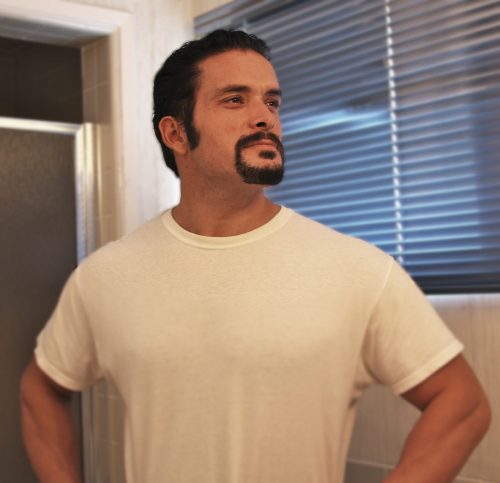 Just for Men Mustache & Beard: Unquestioningly the leader in this category. It’s the first product every man thinks off when he considers dyeing his hair or beard. Unfortunately, many men have had adverse reactions. In fact, this seems to have gotten worse since Just for Men has reformulated its product. If you look at the customer review pages on Amazon, you will find that the first two pages are full of one-star reviews combined with men posting photos of the chemical burns on their faces.
Just for Men Mustache & Beard: Unquestioningly the leader in this category. It’s the first product every man thinks off when he considers dyeing his hair or beard. Unfortunately, many men have had adverse reactions. In fact, this seems to have gotten worse since Just for Men has reformulated its product. If you look at the customer review pages on Amazon, you will find that the first two pages are full of one-star reviews combined with men posting photos of the chemical burns on their faces.
Grizzly Mountain Beard Dye: This gets high marks for its natural ingredients, which make allergic reactions unlikely — something the customers reviewing the product definitely appreciate. On the downside, it takes several applications to have any results at all. Also, several people complained that it turned their beard green.
Godefroy Color Tint Kit: Also very high marks for this one. Good ingredients. Good reviews. Satisfied customers. The one thing we found baffling was the fact that 95% of the reviews were from women using it on their eyebrows and hardly any men seem to use it for their beards. This gives us pause and makes us wonder if there’s something we don’t know.
Henna Guys: This is the quintessential henna beard dye. It’s natural. It’s hypoallergenic. Those are, of course, big plusses. However, there are several reviews that complain about the efficacy of the product. Some customers claim that it didn’t change their beard color at all and they’re still stuck with the gray, and others have mentioned their beards turning… yep, you guessed it: orange.
Bigen Beard Dye: You can tell from our chart that we don’t take this one seriously. Simply because if you fake Amazon reviews you should at least be smart about it and make sure that they don’t all have the same headline and body of text. It seems that this hair color company hasn’t quite perfected their beard dye. Apart from the few reviews their beard dye has (ten… and most seem fake,) it also has some concerning entries regarding skin reactions.
